The Laboratory Planet, 1-4 (2007-2011) [English/French]
Filed under magazine | Tags: · control society, human rights, open spectrum, politics, security, surveillance, tactical media
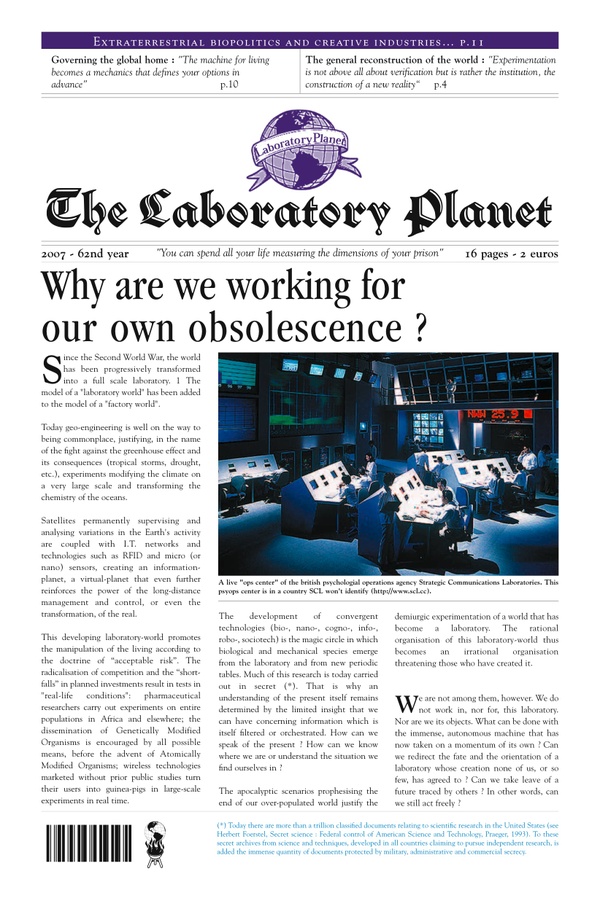
“The Laboratory Planet is a periodic journal of philosophy, science and critical writing on technology. It is published in two versions, English and French, both as print and internet editions. Ewen Chardronnet, Michel Tibon-Cornillot and Bureau d’études, produce Laboratory Planet with a team of artistic researchers, philosophers, scientists and activists. As a journalistic multimedia piece, its online platform discusses geostrategic and tactical media as well as speculative issues lurking behind the ambiguous headlines of the mainstream press.”
Issue 1: Why are we working to our own obsolescence? (2007, English, updated on 2017-12-4)
Issue 1: Pourquoi travaillons nous à notre obsolescence? (2007, French, updated on 2017-12-4)
Issue 2: Hope is not needed to act (July 2008, English, added on 2017-12-4)
Issue 2: Il n’est nul besoin d’espérer pour entreprendre (July 2008, French, updated on 2017-12-4)
Issue 3: The laboratory planet or the terminal phase of nihilism (September 2008, English, updated on 2017-12-4)
Issue 3: La planète laboratoire ou la phase terminale du nihilisme (September 2008, French, updated on 2017-12-4)
Issue 4: La conquète de la Terre par les ordinateurs (October 2011, French, added on 2013-8-1, updated on 2017-12-4)
See also Issue 5.
Makeworlds papers 1-4 (2001-2004)
Filed under magazine | Tags: · activism, civil society, globalisation, human rights, information society, networks
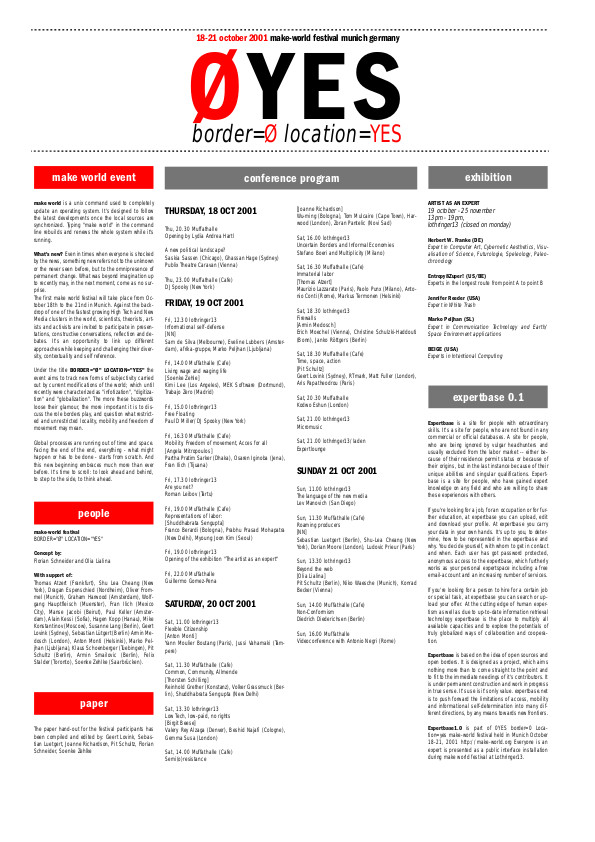
make world is a unix command used to completely update an operating system. It’s designed to follow the latest developments once the local sources are synchronized. Typing “make world” in the command line rebuilds and renews the whole system while it’s running. The first make-world festival took place from October 18th to the 21nd, 2001 in Munich. Against the backdrop of one of the fastest growing High Tech and New Media clusters in the world, scientists, theorists, artists and activists were invited to participate in presentations, constructive conversations, reflection and debates. It was an opportunity to link up different approaches while keeping and challenging their diversity, contextuality and self reference.
Under the title BORDER=”0″ LOCATION=”YES” the make world paper#1 aimed to track new forms of subjectivity carried out by current modifications of the world; which until recently were characterized as “infotization”, “digitization” and “globalization”. The more these buzzwords loose their glamour, the more important it is to discuss the role borders play, and question what restricted and unrestricted locality, mobility and freedom of movement may mean.
Compiled and edited by Geert Lovink, Sebastian Luetgert, Joanne Richardson, Pit Schultz, Florian Schneider, Soenke Zehlke
32 pages
PDF (updated on 2013-8-10)
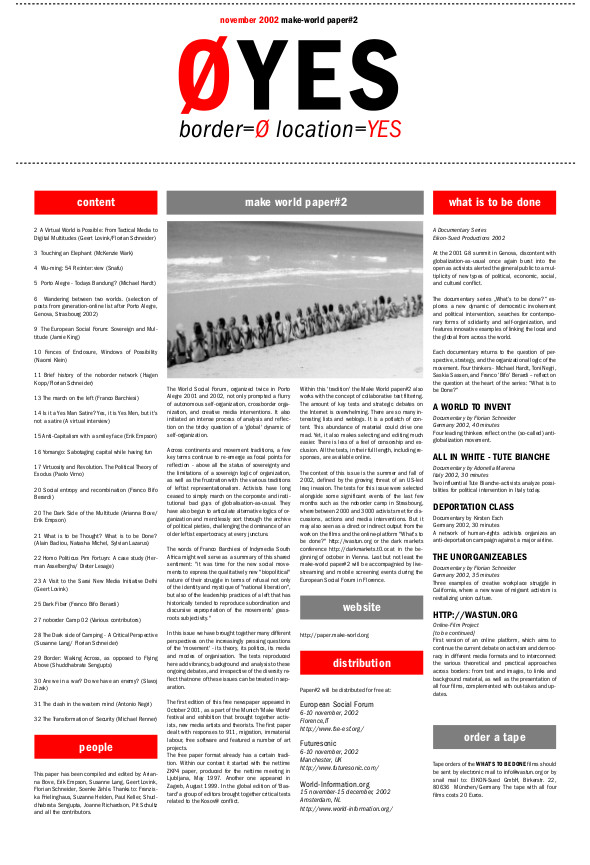
One year after the make-world conference, paper#2 has been released at the occasion of the European Social Forum in Florence in the beginning of November 2002.
Compiled and edited by Arianna Bove, Erik Empson, Susanne Lang, Geert Lovink, Florian Schneider, Soenke Zehlke
32 pages
PDF (updated on 2013-8-10)
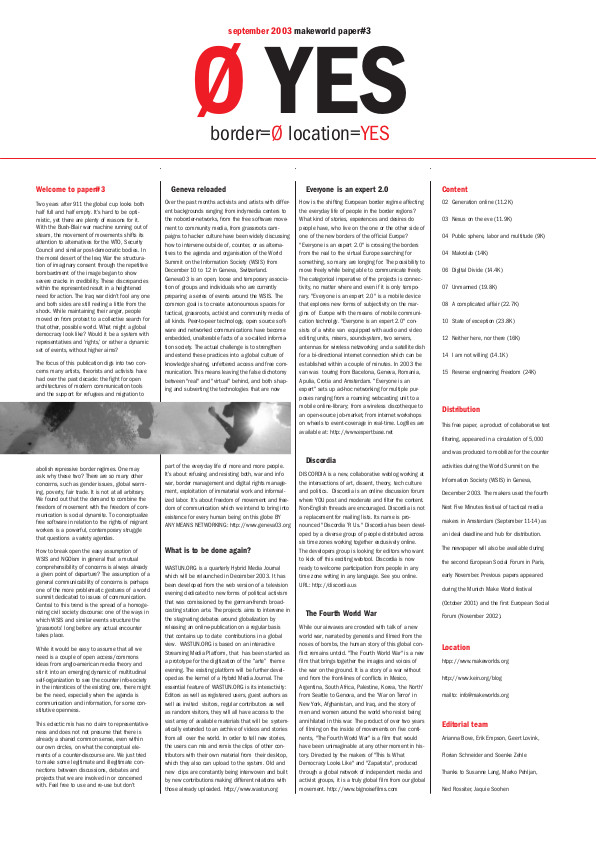
Make world paper3 has been published on 11 September 2003. It is the third edition of a free newspaper that is distributed in 5,000 copies. Paper3 is geared towards the World Summit on the Information Society in Geneva, in December 2003.
Edited by Arianna Bove, Erik Empson, Geert Lovink, Florian Schneider, Soenke Zehlke
16 pages
PDF (updated on 2013-8-10)
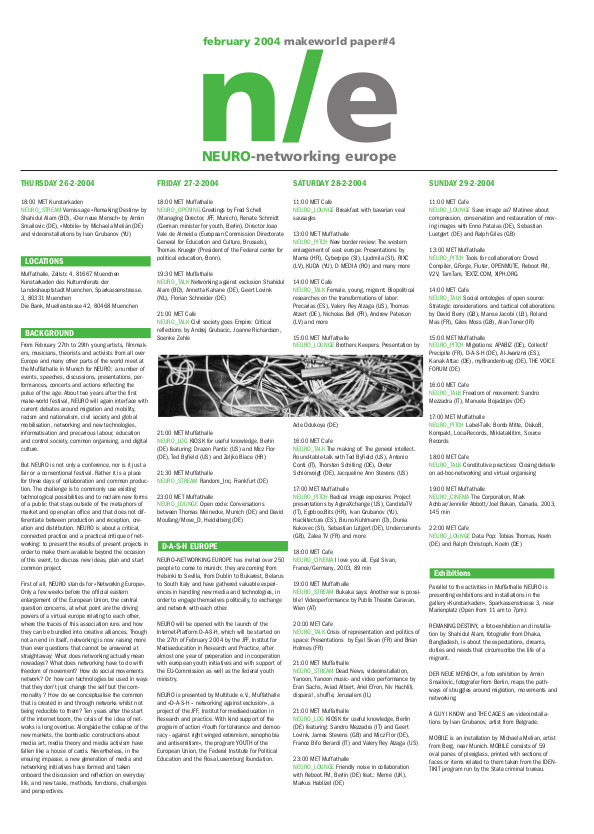
Makeworlds paper#4 is a product of collaborative text filtering and appeared in a circulation of 10,000 hard copies on dead tree. It was produced as a collection of associated or complementary or auxiliary text material at the occasion of NEURO–networking europe, from February 26-29, 2004 in Munich (DE). But also beyond the actual event the paper will be valuable as a entry point to the various debates, presentations, workshops and audio-visual productions during and around the festival.
Edited by Arianna Bove, Annett Busch, Erik Empson, Susanna Lang, Geert Lovink, Sebastian Luetgert, Florian Schneider, Mathias Wrba, Soenke Zehlke
Publisher Multitude, Bernau b. Berlin
32 pages
PDF (updated on 2013-8-10)
Comment (0)Geert Lovink, Sabine Niederer (eds.): Video Vortex Reader: Responses to Youtube (2008)
Filed under book | Tags: · aesthetics, human rights, internet, media activism, network culture, online video, politics, theory, video, video art, youtube
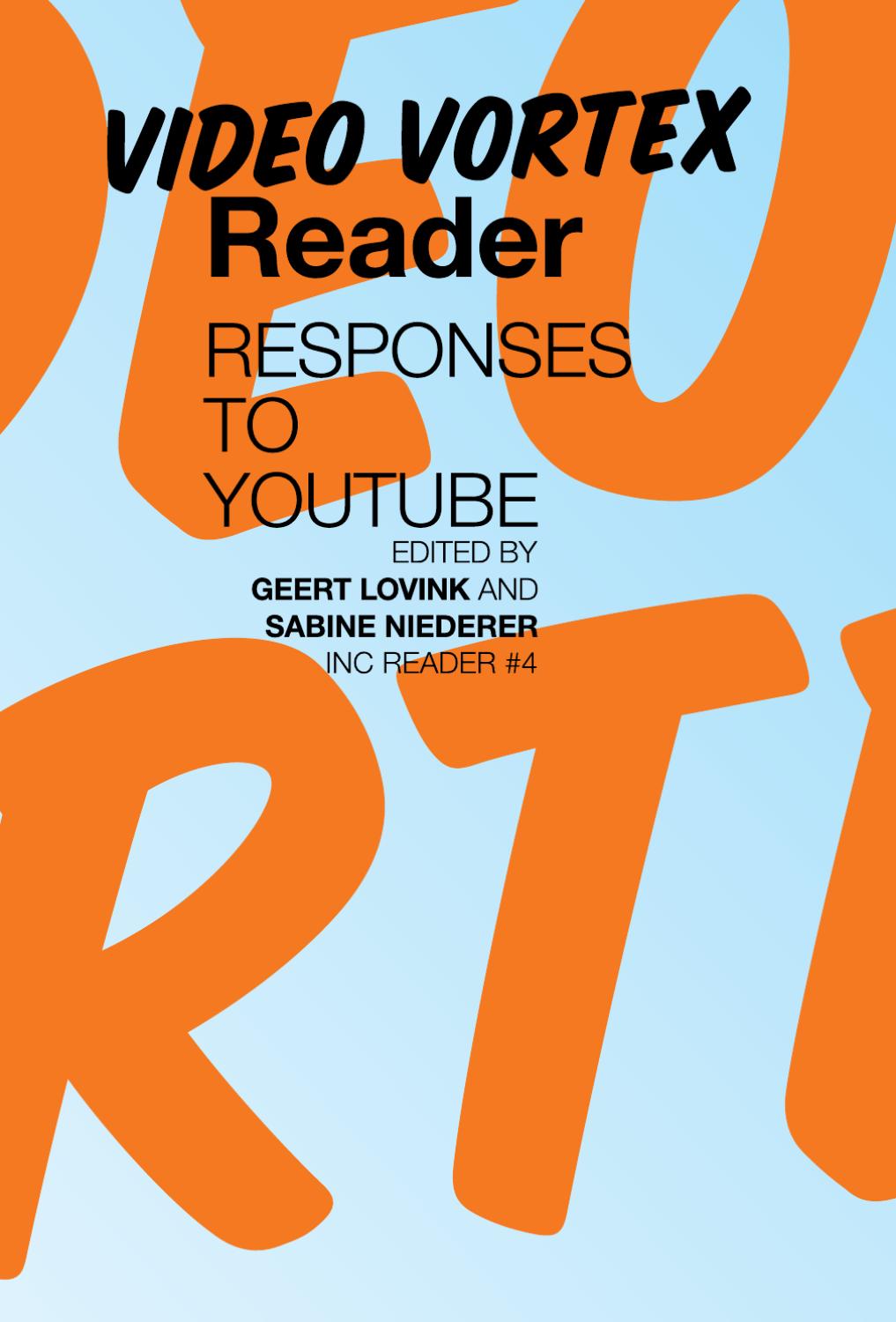
“The Video Vortex Reader is the first collection of critical texts to deal with the rapidly emerging world of online video – from its explosive rise in 2005 with YouTube, to its future as a significant form of personal media. After years of talk about digital convergence and crossmedia platforms we now witness the merger of the Internet and television at a pace no-one predicted. These contributions from scholars, artists and curators evolved from the first two Video Vortex conferences in Brussels and Amsterdam in 2007 which focused on responses to YouTube, and address key issues around independent production and distribution of online video content. What does this new distribution platform mean for artists and activists? What are the alternatives?”
Contributors: Tilman Baumgärtel, Jean Burgess, Dominick Chen, Sarah Cook, Sean Cubitt, Stefaan Decostere, Thomas Elsaesser, David Garcia, Alexandra Juhasz, Nelli Kambouri and Pavlos Hatzopoulos, Minke Kampman, Seth Keen, Sarah Késenne, Marsha Kinder, Patricia Lange, Elizabeth Losh, Geert Lovink, Andrew Lowenthal, Lev Manovich, Adrian Miles, Matthew Mitchem, Sabine Niederer, Ana Peraica, Birgit Richard, Keith Sanborn, Florian Schneider, Tom Sherman, Jan Simons, Thomas Thiel, Vera Tollmann, Andreas Treske, Peter Westenberg.
Editorial assistance: Marije van Eck and Margreet Riphagen
Publisher Institute of Network Cultures, Amsterdam, 2008
INC Reader series, 4
Creative Commons BY-NC-ND 2.5 Netherlands License
ISBN 9789078146056
315 pages
PDF, PDF (updated on 2017-4-11)
Comments (2)
